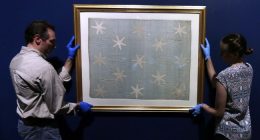An inquiry will continue today into the convictions of Kathleen Folbigg, who has spent almost two decades in prison after being found guilty of killing her four children.
Tom Bathurst KC is conducting the inquiry and will have to form his own view on whether there is any reasonable doubt about the woman’s guilt.
The inquiry comes 19 years after Folbigg was sentenced for the murder of three of her children and the manslaughter of a fourth, and three years after a separate inquiry.

The children, born separately between 1989 and 1997, were aged between 19 days and 18 months old when they died.
Folbigg was charged in April 2001.
The NSW governor has ordered the re-examination following a petition from scientists calling for an inquiry due to new evidence.
Danish genetics experts Professor Michael Toft Overgaard and Professor Mette Nyegaard are slated to give evidence on Tuesday, along with Professor Matthew Cook, an Australian National University immunogenetics expert.
Folbigg and her two daughters Sarah and Laura were found to have a genetic variant that can affect the electrical activity of the heart, which her lawyers have submitted may have led to their deaths.
Read Related Also: Reading between the redacted lines: What affidavit tells us about DOJ’s Trump intentions
Counsel assisting the inquiry, Sophie Callan SC, said on Monday science has advanced in the years Folbigg has spent in prison.
“There was a huge amount of progress between the trial in 2003 and the inquiry in 2019, with more progress since then,” Callan said.

The genetic variant, known as CALM2 G114R, is “exceptionally rare”, Associate Professor Hariharan Raju told Monday’s hearing.
“Overall, I still feel she doesn’t have sufficient data to confirm a diagnosis,” Raju said, noting Folbigg did have some minor abnormalities.
“When I consulted with her, although the DNA variant had been identified, it wasn’t clear at that point whether it was responsible for any disease at all,” he said.
Folbigg was sentenced to 40 years in prison, which was reduced on appeal to 30 years with a non-parole period of 25.
She is not eligible for parole until 2028.









